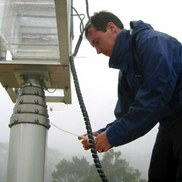Faculty Who Failed Series: Benjamin Z. Houlton

Benjamin Z. Houlton (as a doctoral student at Princeton University in 2004) collecting fog water nitrogen isotopes in Hawaii to test his theoretical model.
November 27, 2023
Graduate school is a time for students to push themselves, try new things, and explore. It’s also a time when students are likely to experience what feels like failure. These small or large challenges along the way to your degree are to be expected, and most faculty members experienced such stumbles themselves in graduate school.
To share stories of successful people who have overcome the setbacks that come with pursuing a graduate degree, we’re interviewing faculty members about how they “failed” in their academic careers. The Faculty Who Failed series highlights how resilience can carry you through the tough times in your degree program and come out of the experience stronger and better prepared for future challenges.
Read about Ronald P. Lynch Dean of the College of Agriculture and Life Sciences and Professor of Global Development and Ecology and Evolutionary Biology Benjamin Z. Houlton’s experiences.
Can you describe a time you felt like you failed in graduate school? This could be a time when an experiment didn’t work out, you considered leaving (or did leave) your program, etc.
When I was in my second year as a Ph.D. student, my committee asked me to create a mathematical model to explore a question I was very interested in pursuing – why does the isotopic composition of nitrogen vary around the planet and what is the influence of climate in shaping the nitrogen cycle? I had a few experiences in computational modeling, and had a set of classes on the subject – especially during my M.S. degree in environmental engineering – but building a model from scratch? How intimidating!
I began working through a set of general equations, and formulated what I thought would be a working model. At first, things progressed nicely – I was able to code different controls, including plant and soil factors, and how the atmospheric controls might regulate nitrogen isotope abundances in terrestrial ecosystems.
But then… a major problem arose…
Every time I tried to run the computer code, the model crashed – it produced the same result no matter how I changed the parameters, which was impossible. Something wasn’t right! But what?
Self-doubt began. First slowly: What was happening? Was I failing in my degree? Could I fix the problem?
Then torrentially: Would this hold me back from my dissertation and my career goals? Would my committee think of me? Would I fail my degree?
Two months went by with no progress.
How did you bounce back from your perceived failure, or what got you through to the other side?
One day, I changed my mindset. Instead of internalizing my perceived failure (and succumbing to my deceiving inner voice), I decided that I would not be defined by the problem, would not be ashamed that I couldn’t figure it out on my own. Rather, I would do something that proved to be one of the most important lessons in my career.
I asked for help.
After meeting with a fellow graduate student – one with substantially superior coding skills than I had – we recognized that my model wasn’t the problem, but rather a simple error in my code. I was missing a “.”. That’s right – a simple period! This omission royally messed up the matrix formula and ordinary differential equation solver I was using. I couldn’t believe it. Voila!
What lessons did you learn from this experience?
Once I inserted a few periods in the right places, my model began performing brilliantly, and I made huge steps forward – not only in my ability to theoretically examine a tricky question with a model and in my dissertation, but in my understanding of the value of asking for help, and the power of humility in scientific research. This was the key to unlocking my potential and overcoming self-doubt: humility.
How did you use this experience to become better at what you do?
This experience has repeated itself – repeatedly. Today, when I’m faced with a vexing challenge, I don’t panic, I ask for help: I seek out the experience, perspective, and counsel of others, and recognize that the humility of not knowing is ultimately what gives rise to personal and professional growth and improvement, which to me, is the goal. And this approach to problem solving is yet to let me down, from a graduate student to a faculty member, institute director, and now dean of CALS. I’m so grateful for the lesson.
What advice do you have for current graduate students who might be struggling or in a comparable situation?
Ask for help, early and often, and embrace of the adventure of not knowing, exploring boundless possibilities with an open-mind, gratitude, and humility. It’s sure to be an enjoyable ride that way!
